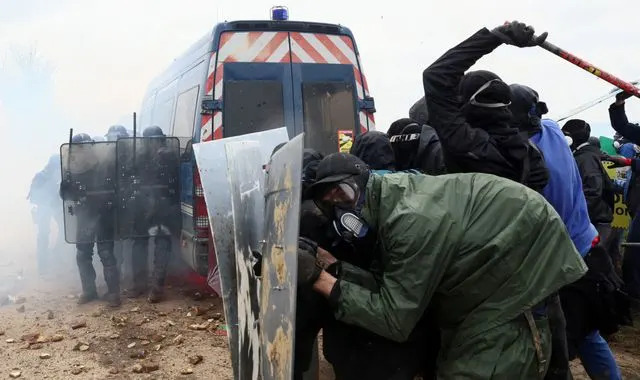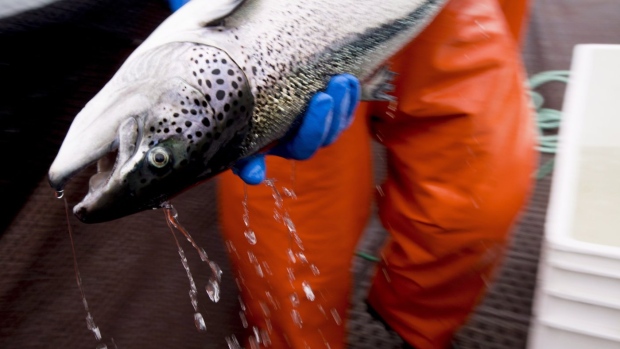Sky News
Sat, 25 March 2023

A protester is in a critical condition and an injured officer has been flown from the scene by helicopter as police clash with thousands of people opposed to plans for a large water reservoir in France.
Several people have been injured in the clashes, which have taken place in the western rural district of Sainte-Soline.
Two protesters were seriously hurt, including one who is in a critical condition after suffering a head injury, as well as
16 police officers, the local prefecture said.
One officer was evacuated by helicopter.
Police fired tear gas to repel some protesters who threw fireworks and other projectiles as they crossed fields to approach the construction area in the district.
At least three police cars caught fire, television footage showed.
Read more:
Emmanuel Macron criticised after slowly taking off expensive watch during interview
Analysis - postponed state visit is embarrassing for Macron
The demonstrators, who have come together despite a ban on gatherings, are opposed to a large water reservoir for farm irrigation.
Around 3,200 police were deployed for the demonstration, said Interior Minister Gerald Darmanin said, who blamed far-left groups for the violence.
The heavy police presence included helicopters and officers riding quad bikes.
Emmanuelle Dubee, the prefect of the surrounding region, said around 1,000 radical protesters were expected among an estimated 6,000 demonstrators.
France's worst drought on record last summer - which was also felt across the UK and Europe - sharpened the debate over water resources in agriculture.
Supporters say artificial reservoirs are a way to use water efficiently when needed, while critics argue they are outsized and favour large farms.
Similar protests erupted last October and resulted in injuries.
The unrest over the irrigation project comes after weeks of demonstrations in France against a pension reform that sees the retirement age rise from 62 to 64.
The protests have turned violent since the government pushed through the legislation without a final parliamentary vote, with piles of rubbish set alight on the streets of Paris, riot police firing tear gas and more than 300 arrests.
The King's state visit to France, which was due to begin on Sunday, has been postponed amid the ongoing violence and unrest.
Issued on: 25/03/2023
French security forces again clashed with protesters Saturday as campaigners sought to stop the construction of reservoirs for the agricultural industry in the southwest of the country, AFP correspondents said.
The violent scenes in Saite-Soline in western France came after days of violent protests nationwide over President Emmanuel Macron's pension reform that prompted the cancellation of a visit by King Charles III of the UK.
A long procession set off late morning, comprising at least 6,000 people according to local authorities and around 25,000 according to the organisers.
More than 3,000 members of the security forces were deployed, with "at least 1,000" potentially violent activists, including some from Italy, present, officials said.
Around the construction site, defended by the police, violent clashes quickly broke out between the security forces and radical militants, AFP correspondents said.
Multiple projectiles and improvised explosives were thrown by protesters, with police responding with tear gas and water cannon.
"While the country is rising up to defend pensions, we will simultaneously stand up to defend water," said the organisers gathering under the banner of "Bassines non merci" ("No to reservoirs, thank you").
Eleven people were already detained after police seized cold weapons, including petanque balls and meat knives, as well as explosives.
The protest movement against the pension reform have turned into the biggest domestic crisis of Macron's second mandate, with daily clashes in the streets of Paris and other cities between police and protesters.
(AFP)
Issued on: 25/03/2023 -
Sainte-Soline (France) (AFP) – French police again clashed with protesters Saturday as campaigners sought to stop the construction of reservoirs in the southwest, the latest in a series of violent standoffs as social tensions erupt nationwide.
The violent scenes in Sainte-Soline in western France came after days of violent protests nationwide over President Emmanuel Macron's pension reform that prompted the cancellation of a visit by King Charles III of the UK.
The protest movement against the pension reform have turned into the biggest domestic crisis of Macron's second mandate, with daily clashes in the streets of Paris and other cities between police and protesters.
Several protesters and members of security forces were wounded in the clashes around Saite-Soline as campaigners sought to stop the construction of reservoirs for the agricultural industry, according to the authorities.
A long procession set off late morning, comprising at least 6,000 people according to local authorities and around 25,000 according to the organisers.
More than 3,000 members of the security forces were deployed, with "at least 1,000" potentially violent activists, including some from Italy, present, officials said.
Around the construction site, defended by the police, violent clashes quickly broke out between the security forces and radical militants, AFP correspondents said.
'Simultaneously stand up'
Multiple projectiles and improvised explosives were thrown by protesters, with police responding with tear gas and water cannon.
Two protesters were seriously wounded, including one who was hospitalised with a brain injury, the authorities said.
Sixteen members of the security forces were wounded, six of whom were hospitalised regionally and one of whose injuries were so serious he was evacuated by helicopter.
"While the country is rising up to defend pensions, we will simultaneously stand up to defend water," said the organisers gathering under the banner of "Bassines non merci" ("No to reservoirs, thank you").
Eleven people were detained after police seized cold weapons, including petanque balls and meat knives, as well as explosives.
While not directly related to the anti-pensions reform campaign, the clashes over the water reservoir construction have added to tensions in an increasingly challenging situation for the government.
After the worst clashes yet of the three-month movement on Thursday night, protest activity has been less intense in the last 24 hours.
But the government is bracing for another torrid day on Tuesday when unions are due to hold another day of strikes and protests.
This would have been the second full day of Charles' visit, which now must find a new date in his packed calendar. Instead, Germany will be his first foreign destination as monarch.
The scenes in France have sparked astonishment abroad. "Chaos reigns in France," said the Times of London above a picture of rubbish piling up. "Macron surrenders to the mob," said the mass-circulation Daily Mail over the cancellation of the king's visit.
'I will not give up'
Uproar over legislation to raise the retirement age from 62 to 64 was enflamed when Macron exercised a controversial executive power to push the plan through parliament without a vote last week.
The streets of the capital have also been strewn with rubbish because of a strike by waste collectors.
But there has also been controversy over the tactics used by the French security forces to disperse the protests.
The Council of Europe -- the continent's leading human rights watchdog -- warned that sporadic acts of violence "cannot justify excessive use of force by agents of the state" or "deprive peaceful protesters of their right to freedom of assembly".
Macron has defiantly refused to offer concessions, saying in a televised interview Wednesday that the changes needed to "come into force by the end of the year".
The Le Monde daily said Macron's "inflexibility" was now worrying even "his own troops" among the ruling party.
"I will not give up seeking to convince," Borne told a conference on Saturday.
"I will not give up on building compromises. I will not give up on acting. I am here to find agreements and carry out the transformations necessary for our country and for the French."
© 2023 AFP










